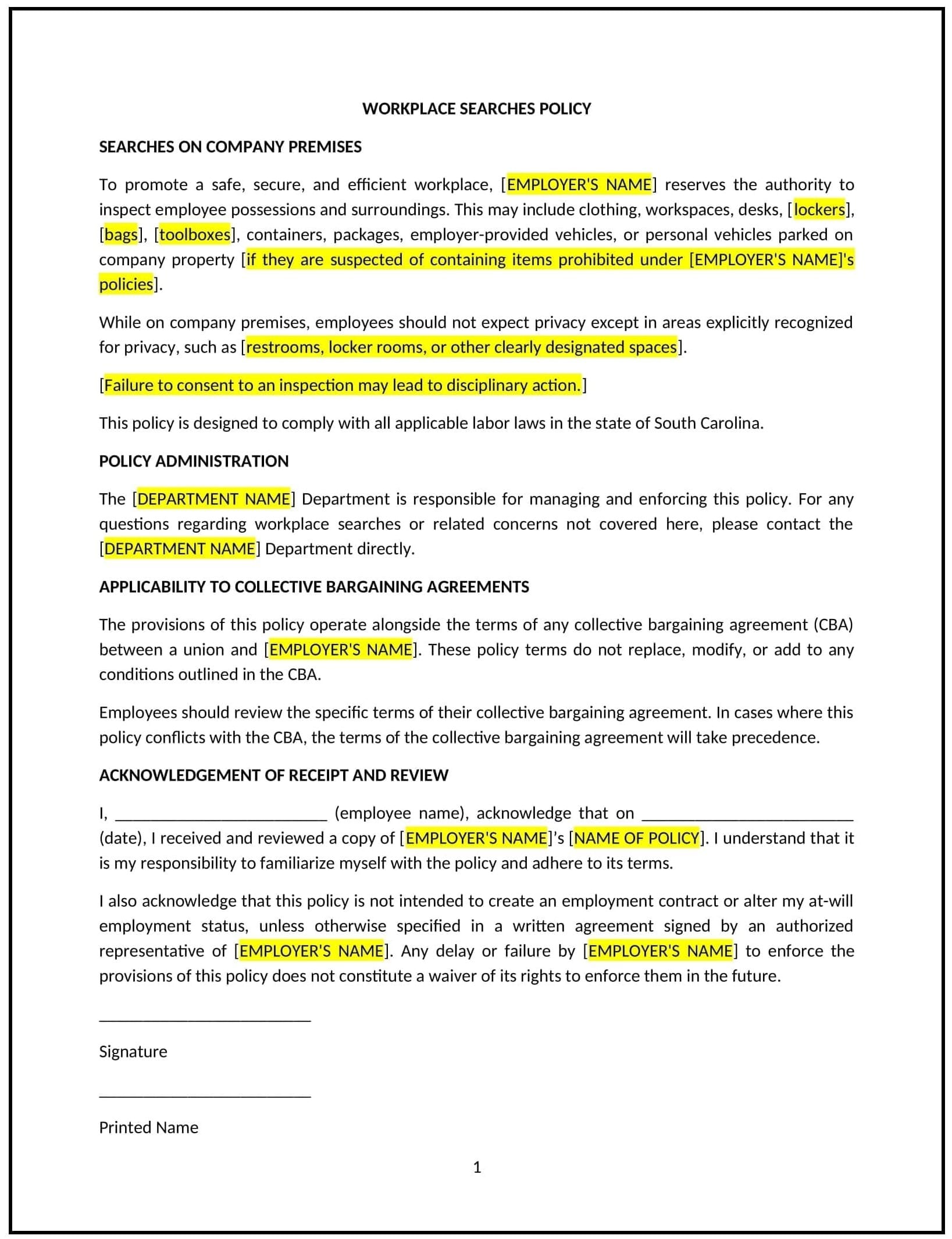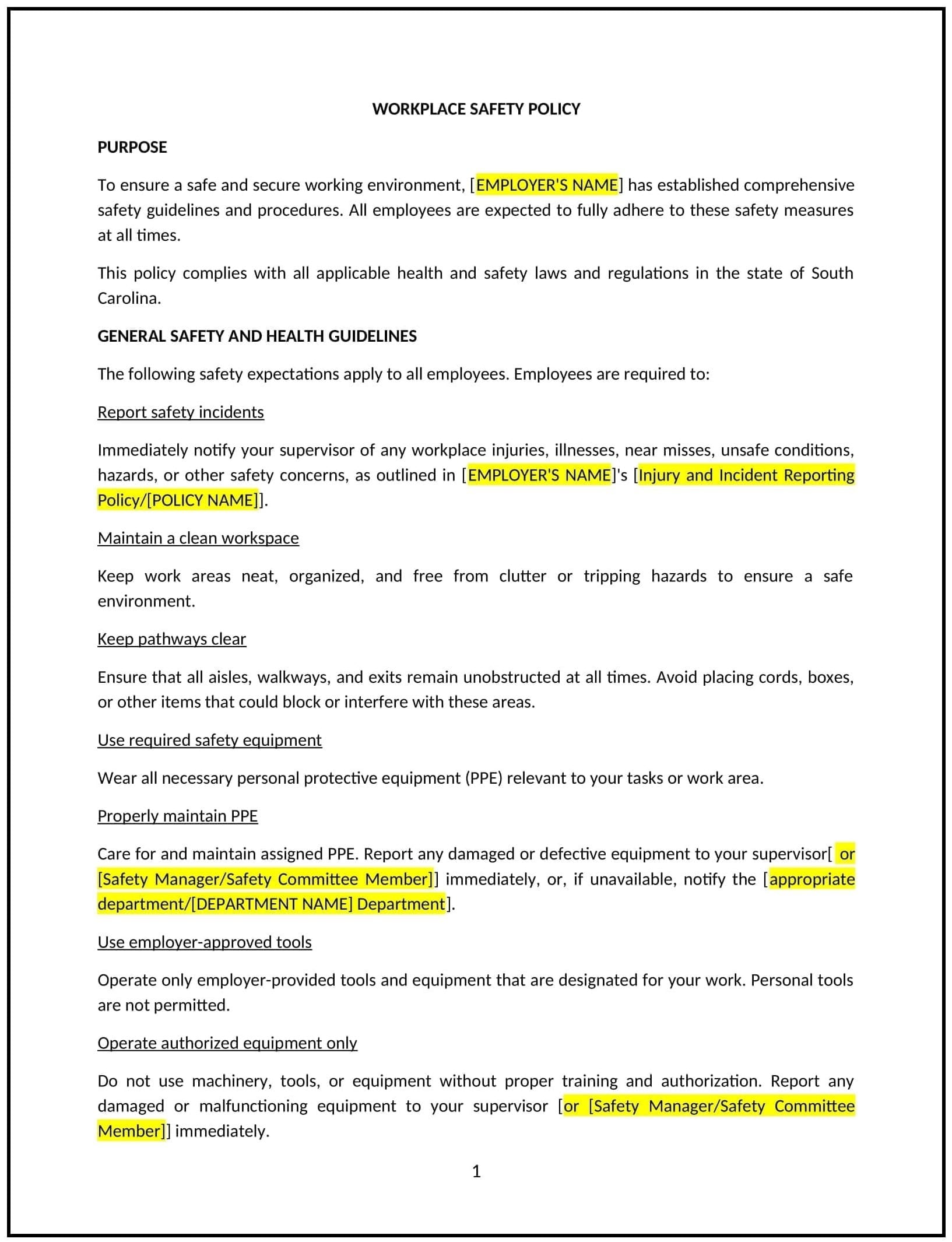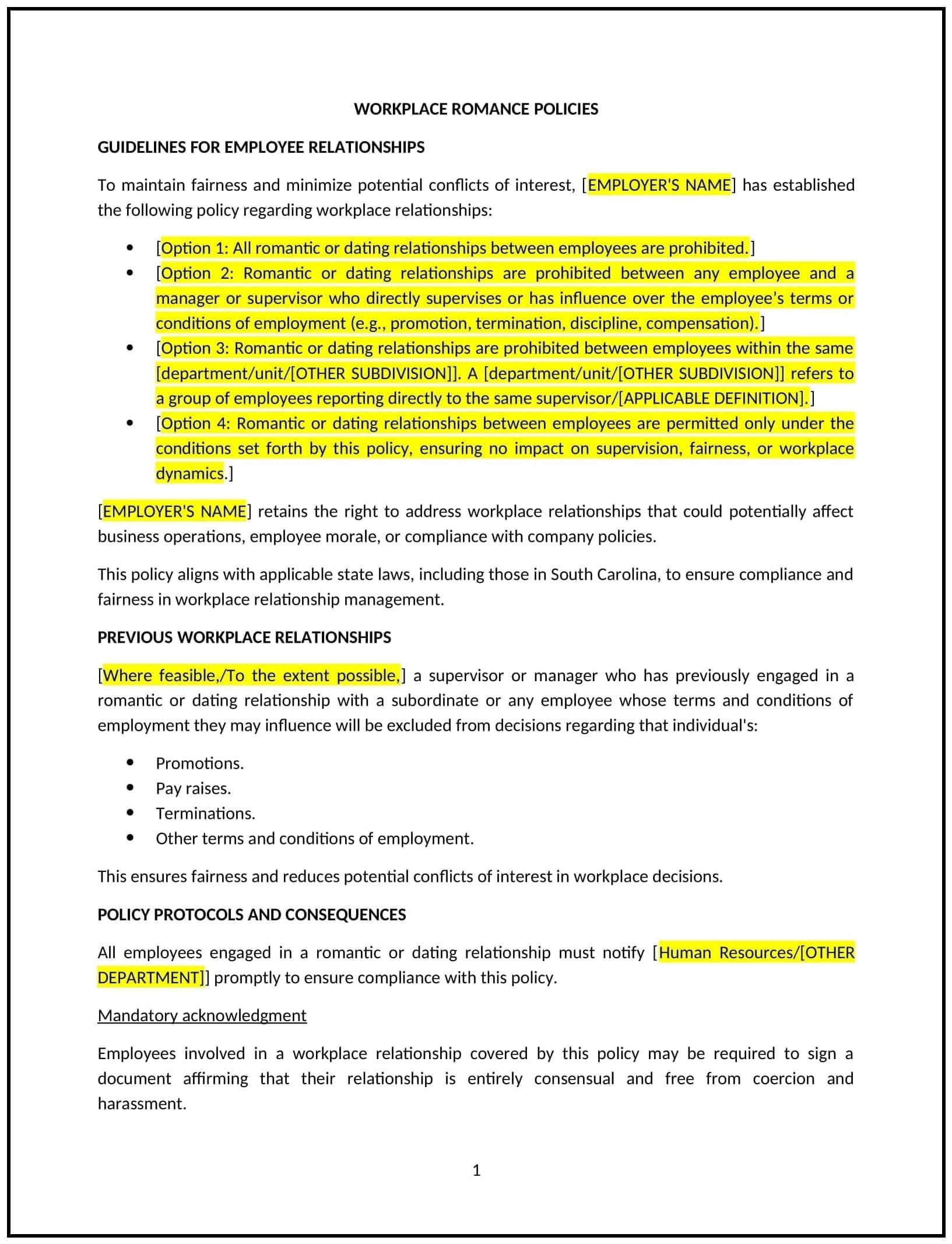Workplace searches policy (Ohio): Free template

Workplace searches policy (Ohio)
A workplace searches policy outlines the procedures for conducting searches of employees, their personal belongings, and company property in Ohio. This policy is designed to balance the business’s need to protect its property, confidential information, and workplace safety with respect for employee privacy. It specifies the conditions under which searches may be conducted, the types of searches that may be performed (e.g., personal bags, lockers, vehicles), and the process employees should follow if a search is requested. The policy also addresses the business’s authority to conduct searches and any actions taken in response to the discovery of prohibited items.
By implementing this policy, Ohio businesses can maintain a secure workplace, protect company assets, and ensure that employees understand the conditions under which searches may occur.
How to use this workplace searches policy (Ohio)
- Define search procedures: The policy should specify the types of searches that may be conducted (e.g., bag searches, desk or locker searches, vehicle searches), the circumstances under which they may occur (e.g., suspicion of theft, workplace violence), and who is authorized to conduct the searches (e.g., HR, security personnel).
- Set expectations for consent: The policy should outline whether employee consent is required before a search is conducted, or if searches may occur without consent under certain conditions. It should specify any required steps, such as notifying employees before conducting a search.
- Clarify privacy considerations: The policy should emphasize that searches will be conducted in a manner that respects employee privacy, and it should specify how personal items (e.g., personal bags, vehicles) will be treated during searches. It should address how sensitive personal information will be handled to ensure confidentiality.
- Address prohibited items: The policy should define what constitutes prohibited items, such as drugs, weapons, alcohol, or any materials that violate company policies. It should be clear about the consequences of bringing such items to the workplace, including disciplinary actions.
- Establish reporting procedures: The policy should clarify how employees should report concerns related to searches or any items discovered during a search. Employees should know how to raise questions or objections without fear of retaliation.
- Outline disciplinary actions: The policy should specify the consequences for refusing to comply with a search, as well as the actions the business will take if prohibited items are discovered during a search, such as disciplinary action, termination, or legal action.
- Provide transparency: The policy should ensure that employees understand when and why searches may be conducted and outline the process to ensure transparency and fairness. Employees should feel confident that searches are being conducted for legitimate business purposes and not as a form of harassment.
- Review and update regularly: The policy should be reviewed periodically to ensure it remains in line with Ohio state laws, federal regulations, and the evolving needs of the business.
Benefits of using this workplace searches policy (Ohio)
This policy provides several key benefits for Ohio businesses:
- Protects company property and assets: By allowing searches, the policy helps businesses prevent theft, fraud, or misuse of company property and resources, ensuring that valuable items or confidential information are secure.
- Promotes workplace safety: Searches can help identify dangerous or prohibited items, such as weapons or drugs, that may pose a risk to employee safety. The policy helps maintain a safer work environment by deterring individuals from bringing dangerous items to work.
- Reduces legal risks: A clear and well-communicated workplace searches policy helps businesses minimize the risk of legal disputes by setting clear guidelines for how searches should be conducted and by ensuring that the policy complies with Ohio state laws and federal regulations regarding employee privacy and rights.
- Enhances trust and transparency: When employees understand the rationale behind the policy and the process for conducting searches, they are more likely to trust the business’s intentions and feel that searches are conducted fairly and appropriately.
- Supports a professional work environment: By ensuring that employees adhere to company policies and maintain professional conduct, the policy helps reinforce a respectful and secure workplace culture.
- Provides consistency: A clearly defined workplace searches policy ensures that searches are conducted consistently across all employees, regardless of their position within the business, and helps prevent accusations of favoritism or bias.
Tips for using this workplace searches policy (Ohio)
- Communicate the policy clearly: Ensure that all employees are aware of the workplace searches policy by including it in the employee handbook, discussing it during onboarding, and providing regular reminders about the circumstances under which searches may occur.
- Maintain confidentiality: Ensure that any personal items discovered during a search are handled with confidentiality. Employees should be reassured that sensitive personal information will not be disclosed without proper authorization.
- Provide training for managers: Train supervisors and HR personnel on the proper procedures for conducting searches to ensure that they are carried out respectfully, legally, and consistently.
- Handle objections professionally: If an employee objects to a search, the policy should specify how such objections will be handled and ensure that the business responds professionally and in compliance with legal requirements.
- Review and update the policy regularly: The policy should be reviewed periodically to ensure it reflects Ohio state laws, federal regulations, and any changes to the business’s operational needs. Make necessary updates to reflect any changes in the legal landscape or business practices.
Q: What types of searches are covered by this policy?
A: The policy should specify the types of searches allowed, such as bag searches, desk or locker inspections, and vehicle searches, and outline when these searches may be conducted, such as during suspicion of theft or violation of company policies.
Q: Do employees need to consent to a search?
A: The policy should clarify whether employee consent is required before conducting a search or if searches may take place without consent under certain circumstances, such as when there are reasonable grounds to suspect violations of company policies.
Q: What items are prohibited under the workplace searches policy?
A: The policy should clearly outline prohibited items, including weapons, drugs, alcohol, and other contraband. It should also specify the consequences of bringing these items to the workplace, including potential disciplinary action.
Q: Can an employee refuse to be searched?
A: The policy should specify the consequences if an employee refuses to comply with a search, including potential disciplinary action, up to and including termination. The policy should be clear about the importance of compliance for maintaining workplace security.
Q: How does the business handle sensitive personal items during a search?
A: The policy should outline how personal items, such as bags or personal devices, will be handled respectfully and confidentially during a search. The business should take care to protect employee privacy while addressing any concerns related to workplace safety or misconduct.
Q: What happens if prohibited items are discovered during a search?
A: If prohibited items are found, the policy should outline the steps the business will take, including disciplinary actions or legal steps, based on the severity of the violation. Employees should be informed about the consequences of possessing such items.
Q: How should employees report concerns related to searches?
A: Employees should report any concerns about workplace searches or the handling of personal items through the appropriate channels, such as HR or a designated contact. The policy should specify the process for reporting concerns and the steps the business will take to address them.
Q: How often should the workplace searches policy be reviewed?
A: The policy should be reviewed periodically, at least annually, to ensure that it aligns with Ohio state laws, federal regulations, and any changes in workplace safety standards. Regular reviews help ensure the policy remains effective and up-to-date.
This article contains general legal information and does not contain legal advice. Cobrief is not a law firm or a substitute for an attorney or law firm. The law is complex and changes often. For legal advice, please ask a lawyer.


